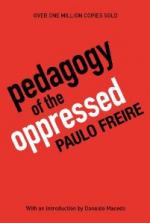
|
| Name: _________________________ | Period: ___________________ |
This test consists of 15 multiple choice questions and 5 short answer questions.
Multiple Choice Questions
1. Why, according to Friere, do oppressive regimes maintain untested feasibilities?
(a) To make freedom desirable.
(b) To make freedom a reality.
(c) To make freedom sensible.
(d) To make freedom appear dangerous.
2. How does Friere's problem-solving education promote equality?
(a) Students are paid for their time at school.
(b) Students are allowed to speak when spoken to.
(c) It gives students rights.
(d) It treats the students with respect.
3. What does Friere call this system of oppressive education?
(a) Banking Education.
(b) Problem-Posing Education.
(c) Problem-Solving Education.
(d) Military Education.
4. What is an ‘Epochal Unit’?
(a) A phase in prehistory.
(b) A discussion of the future.
(c) A type of rock.
(d) A phase in history.
5. What form of education does Friere determine is a contradiction?
(a) The Private Education.
(b) The Religious Education.
(c) The banking-education system.
(d) The Scientific Education.
6. What does Friere mean by 'codifications'?
(a) Titles and honors.
(b) Secret messages.
(c) Materials to be decoded.
(d) Teaching aids.
7. How does a dialogue help the students, according to Friere?
(a) It allows them to see the sense of the teacher's views.
(b) It encourages their vocal skills.
(c) By asking them to think about their problem and think up new ways to deal with it.
(d) It teaches them how to agree with the political party.
8. How does the educator use Themes and Epochal Units?
(a) He recognizes them and encourages students to do the same.
(b) He tells the students when to avoid them.
(c) He tries to ignore them.
(d) He tells the students which one is right or wrong.
9. In his teaching of opposed dualisms, what philosopher is Frier referencing?
(a) Hegel.
(b) Kant.
(c) Descartes.
(d) Nietzsche.
10. What is a ‘Thematic Universe’?
(a) Issues that most people overlook.
(b) Issues or problems that are important to a Subject.
(c) A type of book.
(d) Issues important to the whole world.
11. What does 'inclusive education' mean?
(a) No members of society are allowed to be educated.
(b) Most of society is allowed to be educated.
(c) All members of society should be allowed to be educated.
(d) Some members of society are allowed to be educated.
12. How would a teacher teach in Friere's new education system outlined in Part 2?
(a) The teacher would never tell the student the answer.
(b) Both teacher and student would look jointly at a common problem.
(c) The student would ask all of the questions.
(d) The teacher would tell the student what to answer.
13. In what ways, according to Friere, does the educator have power over the students’ knowledge?
(a) Only the educator can write on the blackboard.
(b) The educator knows which answer is right and wrong.
(c) The educator gives out gold stars to good students.
(d) The educator knows where the textbooks are kept.
14. What form does his education then take?
(a) Tailored to each school.
(b) Tailored to each class and individual.
(c) Must be privately funded.
(d) Given to the whole class.
15. What symptom makes it obvious to Friere that traditional education is oppressive?
(a) There is still poverty and class divide.
(b) People are still canned at school.
(c) There is still an economic system.
(d) Teachers are given more respect than students.
Short Answer Questions
1. What is the teacher’s role in the problem-solving education?
2. What characterizes an Untested Feasibility?
3. What does Friere's problem-solving system promote?
4. How did Bode use images to teach students?
5. What is a ‘Limit Act’?
|
This section contains 620 words (approx. 3 pages at 300 words per page) |

|




